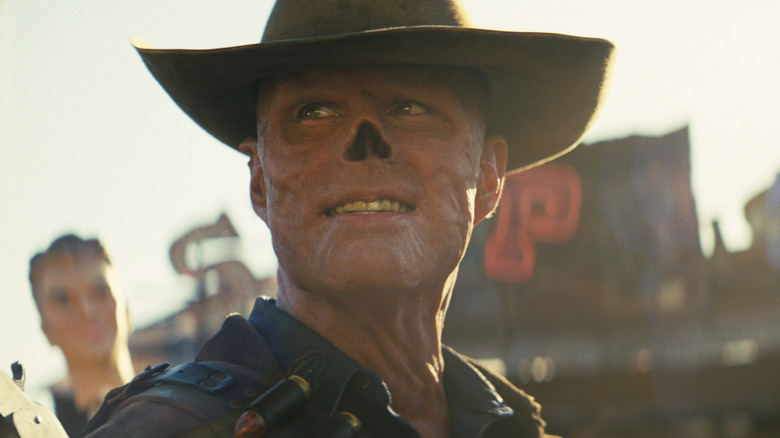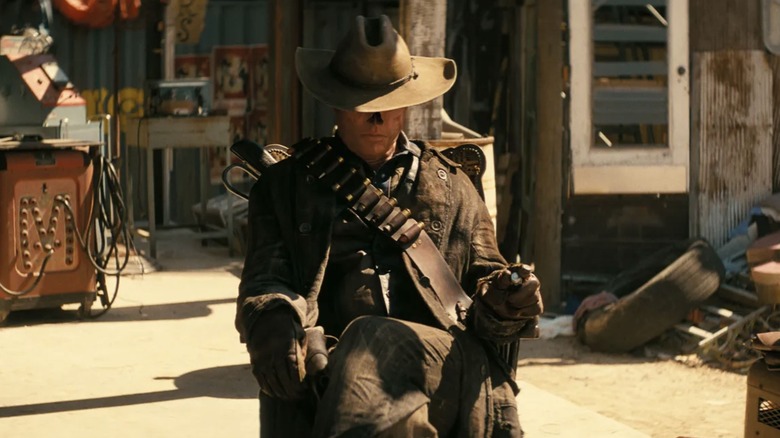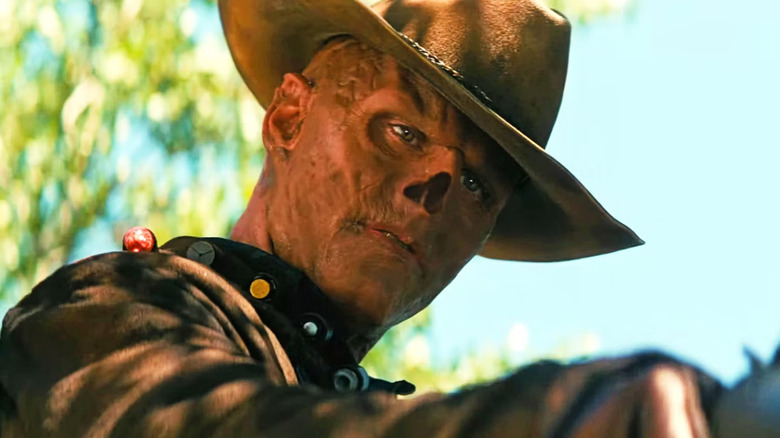The Different Kinds Of Fallout Ghouls Explained For Franchise Newcomers
"Fallout" spoilers follow.
The highly anticipated "Fallout" live-action adaptation is finally here and it lives up to expectations. This is a post-apocalyptic story that is simple enough to be universal — a girl searching for her kidnapped father, while multiple stories converge around a bounty. And yet, much like James Cameron's "Avatar," it is the worldbuilding that is the star. This is not Pandora, of course, but the wasteland, a nuclear landscape that is still as tangible as George Miller's "Mad Max" world, full of history and lore.
The show brings the games to life through some exquisite production design. Every aspect of the wasteland, from the ruins of the old world to the many mutated creatures roaming it, to the game's unique brands scattered throughout, and the detailed vaults that safeguard the remnants of non-radiated humanity. Like the games, there's a lot of visual storytelling going on here, with the background of every fame telling a story, and a lot of that story going unexplained.
This certainly applies to the ghouls. Now, headlines were made when Walton Goggins was tapped to star as a disfigured character known as The Ghoul, a mutated man of the wasteland. We see and learn plenty about the ghouls, but "Fallout" doesn't explain everything. That's where this handy guide comes in. There are four main "Fallout" games plus several spin-offs, with plenty of worldbuilding and history about the ghouls that populate the wasteland. So flash, a-bam alakazam — let's explore the different kinds of fallout ghouls.
Ghoulish endeavour
As we see in the opening scene of the first episode, Goggins' character is actually named Cooper Howard, who lived in the times before the nuclear holocaust that turned the planet into a wasteland. Like most ghouls, the residual irradiation deeply impacted Howard's physiology. Over the years, then decades, a ghoul's lifespan is greatly extended, but their bodies are deformed — their nose falls off and their skin turns zombie-like (though Goggin's ghoul is still hot, which is important).
The ghoul is one of the most memorable elements of the "Fallout" franchise, serving as both antagonists and allies of the player character. They can retain their intelligence and humanity, and are no longer affected by most radiation or by most drugs — as seen when Goggin's The Ghoul was completely unaffected by Lucy's tranquilizer gun.
Not everyone in the wasteland turns into a ghoul in the games, but the show seems to hint that ghouls are this world's version of zombies in "The Walking Dead" where everyone is doomed to eventually turn into a walker, based on comments from Lucy about eventually looking like Howard.
Though ghouls are still just humans, a lot of them fall into an animalistic, feral state. Their minds deteriorate by radiation, and they become actual zombies, as we see in episode 4 when Lucy is attacked by ghouls. In the games, ghouls go feral mostly due to social isolation, or mental breakdown caused by the trauma of the ghoulish transformation.
That's not the case in the show, it seems. Throughout the season we see Howard use some kind of drug or serum. We learn that this is the only thing that prevents him from going feral, which may be a reference to the "Fallout 4" character John Hancock who is addicted to drugs.
Crawl out through the fallout, baby
This is a fantastic addition to the "Fallout" mythos: everyone is destined to become a ghoul, yet the one thing that would prevent them from going feral is virtually inaccessible — Howard says he's managed to live for so long because he's good at making money, meaning killing/selling people. It is cruel and horrific, and it's completely in line with the games.
"Fallout" is all about how awful life is — which makes sense given the post-apocalyptic setting. It's about dark irony, and staring at nuclear annihilation while laughing. The "Fallout" show, much like "The Last of Us," is all about how morality changed after the nuclear holocaust, yet how many things remained the same, like class warfare and inequality. The anti-feral serum being hard to get is proof of this, and it is very effective for the story of the show.
Of course, there is another kind of mutated creature roaming the wasteland, at least in the games: the Super Mutants, who are bigger and stronger than ghouls. They are actual brutes who were created by exposure to an artificial virus that mutated people for the purpose of creating super soldiers but resulted in the creation of monsters. We haven't seen one in the "Fallout" show — probably because they would bring nothing but destruction.


